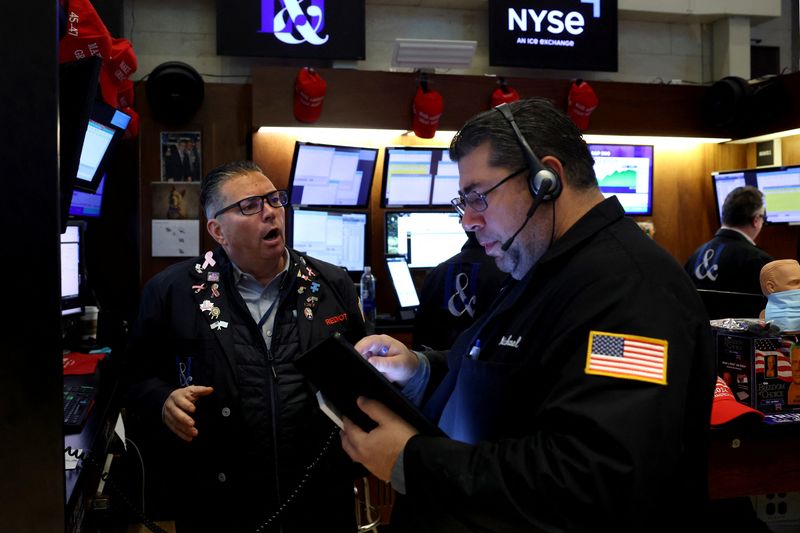Stocks surge to record highs as Trump returns to presidency
By Chuck Mikolajczak
NEW YORK (Reuters) -U.S. stocks rallied sharply to close at record highs on Wednesday after Republican Donald Trump won the 2024 U.S. presidential election in a stunning comeback four years after being voted out of the White House.
The Dow Industrials, S&P 500 and Nasdaq Composite each ended at record levels with investors expecting lower taxes, deregulation and a U.S. president who is not shy to weigh in on everything from the stock market to the dollar, although fresh tariffs could bring challenges in the form of a higher deficit and inflation.
The Republican's win powered a rally in so-called "Trump trades," sending U.S. Treasury yields sharply higher, with the benchmark 10-year note yield hitting a four-month high of 4.479%. Bitcoin hit a record high of over $75,000 and the dollar was on track for its biggest one-day percentage gain since September 2022.
Polls indicated a very tight race, with some concern the process could be drawn out before a victor was declared.
"Investors were kind of portfolio jockeying to score up some of their risk exposure in anticipation of an outcome that was going into it, seemingly a toss-up," said Mark Luschini, chief investment strategist at Janney Montgomery Scott in Philadelphia.
"And obviously, it turned very quickly and led to a very much risk-on day today in which anything that isn't tied to the ground from a cyclical or pro-growth standpoint is absolutely launching."
According to preliminary data, the S&P 500 gained 145.04 points, or 2.51%, to end at 5,927.80 points, while the Nasdaq Composite gained 539.48 points, or 2.93%, to 18,978.65. The Dow Jones Industrial Average rose 1,504.51 points, or 3.56%, to 43,726.39.
Both the Dow and S&P 500 registered their biggest one-day percentage gains since November 2022.
Financials jumped as the best performing of the 11 major S&P 500 sectors. Banks , expected to benefit from loosening regulations under Trump, powered the gains, with the S&P 500 bank index up about 10%, its biggest daily jump in two years.
The small-cap Russell 2000 rallied to a three-year high, with the domestically concentrated stocks seen as likely to benefit from easier regulations, lower taxes and less exposure to import tariffs. However, rising Treasury yields could hurt smaller companies, which tend to rely heavily on borrowing and are more sensitive to higher interest rates.
"This move up in interest rates ... if it doesn't stall out here somewhere around this 4.4%, 4.5% level or so, and we start to retest those levels we saw last October of 5%, that could not only put small caps, but the market itself on its heels," said Luschini.
The CBOE Volatility Index , also known as Wall Street's "Fear Gauge," dropped fell to a six-week low of 15.44.
The rate-sensitive real estate and utilities sectors were among the day's few decliners as investors assessed the chances of Trump's policies boosting inflation and altering the Federal Reserve's path of interest rates, which has been a key component of Wall Street's recent rally.
The central bank is widely expected to ease the benchmark interest rate by 25 basis points at its policy-setting meeting ending on Thursday. However, traders have begun to trim bets for a cut in December and the number of reductions expected next year, according to CME's FedWatch Tool.
Stocks viewed as likely to perform well under a second Trump term also advanced, with Trump Media & Technology Group up in very volatile trading while Tesla (NASDAQ:TSLA ) leapt as CEO Elon Musk has supported Trump in his electoral campaign.
Strong gains were also made by shares of cryptocurrency companies, energy firms and prison operators, while renewable energy shares fell.
Markets were also eyeing whether the Republican Party could maintain a majority in the House of Representatives after gaining control of the U.S. Senate, which would lead to less opposition to a Trump agenda.
Source: Investing.com
